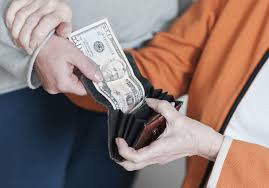 It stands to reason that with more Baby Boomers retiring every day, that there are a lot more elderly people in society, and therefore elderly fraud abuse would be on the rise. I want to make everyone aware of elder fraud abuse and the damage it incurs to us and our loved ones. Here is what I found in my research, and I hope it helps you or any retirees that you know.
It stands to reason that with more Baby Boomers retiring every day, that there are a lot more elderly people in society, and therefore elderly fraud abuse would be on the rise. I want to make everyone aware of elder fraud abuse and the damage it incurs to us and our loved ones. Here is what I found in my research, and I hope it helps you or any retirees that you know.
What Is Elder Fraud or Financial Abuse?
- Elder Financial Abuse is where a perpetrator will take advantage of an elderly person for the express purpose of stealing their money.
- Elder Financial Abuse often takes the form of a person gaining the elder’s trust.
- Elderly people rely on others for help, and that makes them susceptible to financial fraud.
- Advances in technology make it difficult for retirees to understand who they are talking to, and if it’s safe to give out information.
- A lonely, solitary elderly person is a perfect target for fraudsters, because the senior may just want someone to talk to, and will let down their guard.
- Often, health conditions such as dementia and Alzheimer’s can affect an elder person’s ability to make sound financial judgments. Crooks take advantage of this all too often.
“Anyone who sees signs of theft, fraud, misuse of a person’s assets or credit, or use of undue influence to gain control of an older person’s money or property should be on the alert. Those are signs of possible exploitation.” From American Banker’s Association
Statistics
- A 2015 report estimated that older Americans lose $36.5 billion each year to financial scams and abuse.
- 1 in 18 senior citizens with no cognitive disabilities are victimized per year.
- 3 in 10 state securities regulators say they have seen rise in elder fraud cases and complaints.
 How to Prevent it From Happening to You
How to Prevent it From Happening to You
- Plan ahead to protect your assets and to ensure your wishes are followed. Talk to someone at your financial institution, an attorney, or financial adviser about the best options for you.
- Put in place a person that will automatically take over financial issues for you, should you become incapacitated.
- Carefully choose a trustworthy person to act as your agent in all estate-planning matters.
- Set up a second signer for your checking account, and buy checks that have dual signature blanks. Then get a trusted person to be your second signer. That way, you can’t sign checks for big purchases on your own.
- Put a rule in place that says you can’t make a purchase over a certain amount without the approval of your financial adviser.
- If a person calls, texts, or emails you and says they are a trusted relative or friend, and is asking for money, ask a few personal questions that only the real person would know the answer to. This works great for texts and emails in particular. Use another form of communication to contact the person in question to find out if it’s really them.
- Another good tactic would be, if a person calls and says he’s your grandson and he needs money, tell the person you are busy and will call right back. If they give you a call back number, compare it with your REAL grandson’s number. If it’s not the same, call the grandson on his real number to find out if he really needs something. Then have him change his passwords! Call the police and report the fake grandson.
- Lock up your checkbook, account statements and other sensitive information when others will be in your home.
- Order copies of your credit report once a year to ensure accuracy.
- Shred receipts, bank statements and unused credit card offers before throwing them away.
- Never give personal information, including Social Security Number, account number or other financial information to anyone over the phone unless you initiated the call and the other party is trusted.
- Banks and credit card companies will never call and ask for your personal information. THEY ALREADY HAVE IT. This is called PHISHING in the cyber world. If you get a message from your bank asking for your personal information, do not answer it. Report the phishing attack to the FTC at ftc.gov/complaint. If there is any doubt, call your bank (not with the phone number the phisher gave you, but the one on your statement!) to verify any issues.

- Do not open the door to people you don’t know. You are allowed your privacy and security.
- Never pay a fee or taxes to collect sweepstakes or lottery “winnings.”
- Never rush into a financial decision. Ask for details in writing and get a second opinion.
- Consult with a financial adviser or attorney before signing any document you don’t understand.
- Get to know your banker and build a relationship with the people who handle your finances. They can look out for any suspicious activity related to your account.
- Check references and credentials before hiring anyone. Don’t allow workers to have access to information about your finances.
- Pay with checks and credit cards instead of cash to keep a paper trail.
- Feel free to say “no.” After all, it’s your money.
- You have the right not to be threatened or intimidated. If you think someone close to you is trying to take control of your finances, call your local Adult Protective Services or tell someone at your bank.
- Don’t be afraid to stand up for yourself. If an overly persistent crook won’t leave you alone, call the police.
- Trust your instincts. Exploiters and abusers are often very skilled. They can be charming and forceful in their effort to convince you to give up control of your finances. Don’t be fooled—if something doesn’t feel right, it may not be right. If it sounds too good to be true, it probably is.
 What Should You Do If You Become a Victim of Financial Abuse?
What Should You Do If You Become a Victim of Financial Abuse?
- Talk to a trusted family member who has your best interests at heart, or to your clergy.
- Talk to your attorney, doctor or an officer at your bank.
- Contact Adult Protective Services in your state or your local police for help.
Tips for Family and Friends
Watch out for these signs:
- Unusual activity in an older person’s bank accounts, including large, frequent or unexplained withdrawals.
- ATM withdrawals by an older person who has never used a debit or ATM card.
- Changing from a basic account to one that offers more complicated services the customer does not fully understand or need.
- Withdrawals from bank accounts or transfers between accounts the customer cannot explain.
- New “best friends” accompanying an older person to the bank.
- Sudden non-sufficient fund activity or unpaid bills.
- Closing CDs or accounts without regard to penalties.
- Uncharacteristic attempts to wire large sums of money.
- Suspicious signatures on checks, or outright forgery.
- Confusion, fear or lack of awareness on the part of an older customer.
- Refusal to make eye contact, shame or reluctance to talk about the problem.
- Checks written as “loans” or “gifts.”
- Bank statements that no longer go to the customer’s home.
- New powers of attorney the older person does not understand.
- A caretaker, relative or friend who suddenly begins conducting financial transactions on behalf of an older person without proper documentation.
- Altered wills and trusts.
- Loss of property.
 What should you do if you suspect financial abuse?
What should you do if you suspect financial abuse?
- Talk to elderly friends or loved ones if you see any of the signs mentioned here. Try to determine what specifically is happening with their financial situation, such as a new person “helping” them with money management, or a relative using cards or credit without their permission.
- Report the elder financial abuse to their bank, and enlist their banker’s help to stop it and prevent its recurrence.
- Contact Adult Protective Services in your town or state for help.
- Report all instances of elder financial abuse to your local police—if fraud is involved, they should investigate.
In Conclusion:
The bottom line is to be vigilant for yourself and your elderly friends and family. Be careful who you talk to about your financial situation. Make sure your financial records are secure. And just as you would not open the door to a stranger who might hurt you, don’t open the door to potential robbers who would gain your trust, then steal your money.
===>Brought to you by Wealthy Affiliate, the very best in web hosting, education, and community! Please see my review here!<===
Put your questions and comments below, and thank you for reading.
References:
https://www.aba.com/consumers/pages/protectingtheelderly.aspx
https://www.cnbc.com/2017/08/25/elder-financial-fraud-is-36-billion-and-growing.html
https://www.ncoa.org/public-policy-action/elder-justice/elder-abuse-facts/
https://www.cnbc.com/2016/07/08/financial-fraud-is-hammering-retirees-to-the-tune-of-36-billion-a-year.html


That is so sad that people do take advantage of elderly people. Thank you for providing all these ways to prevent it. It looks like you have a very nice website going here. Thanks for linking to wealthy affiliate. I signed up for the premium membership and I have been very happy with it overall. I learned a lot about making a website and I even have my own website now. I have started to get some traffic to my website and I might eventually make some affiliate sales. Thanks for sharing that link at the bottom of the post. Great website and I look forward to hearing more from you in the future.
Hi Charles, thanks for reading and commenting. Yes, it is pretty sad that people take advantage of elderly folks in the ways I mentioned. I am a grandparent and a soon-to-retire person myself, and I can see where a person can be taken advantage of. Thanks too for your comments about Wealthy Affiliate. Both my sites are products of the training I received there. Anyway, thanks again for your comments, and I appreciate you visiting my site! Rhonda